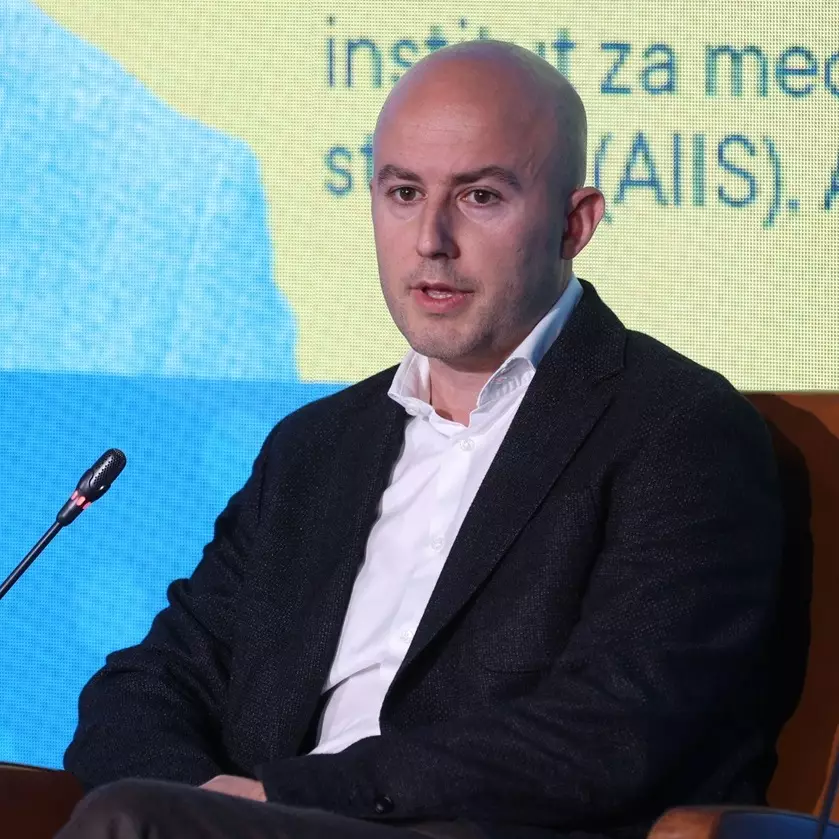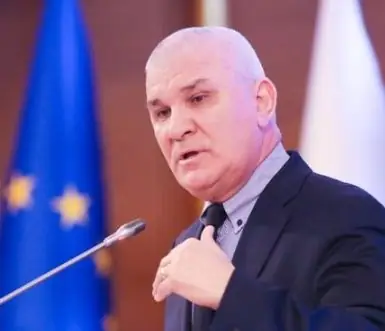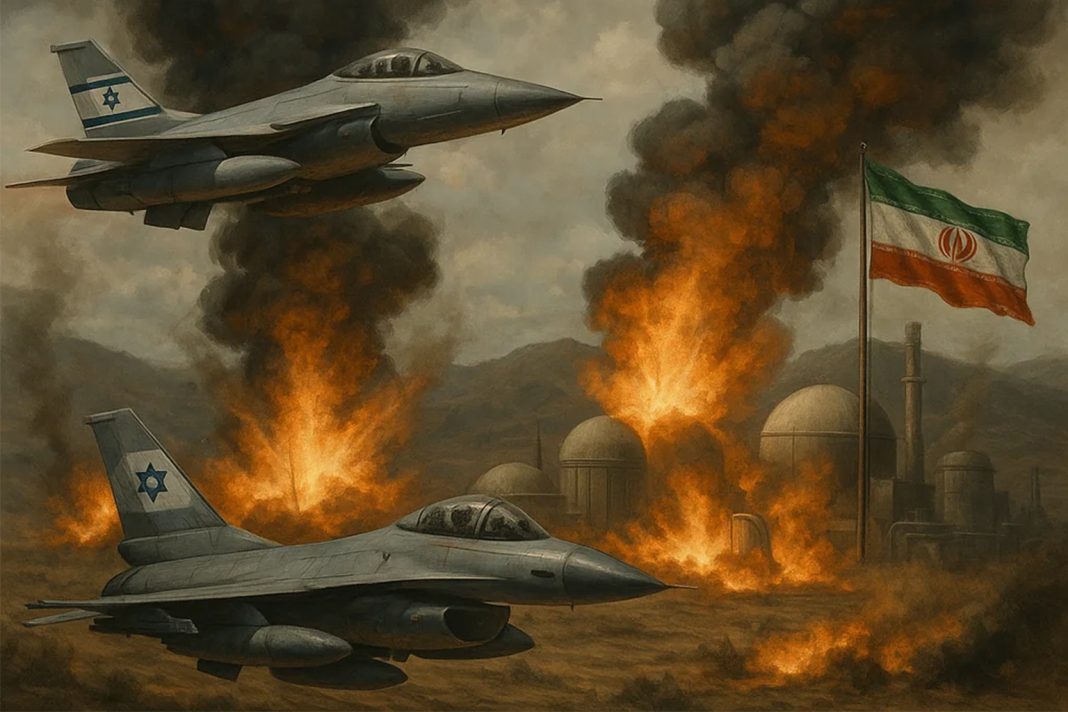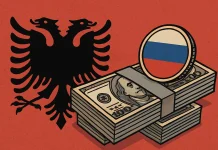By Jona Plumbi
While the United States was engaged in diplomatic talks with Iran to seek the suspension of its nuclear program, Israel launched an armed attack targeting Iran’s nuclear facilities, military bases, as well as senior military officials and nuclear scientists.
According to radicalism and violent extremism expert Adrian Shtuni, Israel’s strike on Iran was motivated by several factors. One of these is Iran’s progress toward developing a nuclear weapon.
‘The International Atomic Energy Agency’s resolution of June 12, which explicitly declared Iran in violation of its nuclear non-proliferation obligations, indirectly supports Israel’s concerns’, Shtuni explains.
Moreover, Israel’s aim may have been to derail any potential agreement between the U.S. and Iran. Considering Israel’s historical mistrust and Iran’s threats that Israel would not survive 25 years, such a deal does not give Israel enough guarantees to stop Iran’s nuclear program.
Another key reason, according to Shtuni, is the favorable military conditions currently present in the region.

‘After Israel managed to massively weaken over the past two years the capacities of organizations such as Hamas, Hezbollah, and the Houthis, and after the fall of Assad’s regime in Syria, all of which were financed, trained, and armed by Iran as a ‘gun to the head’ against Israel, it found the moment favorable to strike the main center or base of the threat that had long loomed’. – Adrian Shtuni, author and researcher of radicalism and violent extremism.
U.S. Support
The U.S. aimed to resolve the threat of Iran’s nuclear armament through diplomatic means. Until one day before the Israeli attack, Trump insisted that the U.S. ‘remains committed to a Diplomatic Resolution’.
But only 14 hours after Israel launched the strike, Trump announced that he had given Iran a 60-day deadline to reach a deal and that this deadline had expired. The U.S. president’s statements continued without ruling out any scenario, until June 22, when he bombed three Iranian nuclear sites: Fordow, Natanz, and Isfahan.
Fordow was located deep underground, and Israeli bombs lacked the capacity to destroy it.
Adrian Shtuni explains for Faktoje that to damage the tunnels of the Fordow complex, where 2,700 uranium enrichment centrifuges were located, Massive Ordnance Penetrator (MOP) GBU-57 bombs weighing 13 tons were used.
These shells are possessed only by the U.S. and can only be transported by B-2 Spirit stealth bombers, which are undetectable by radar and are also owned solely by the U.S.
So far, the United States has been involved in the conflict primarily in a defensive role, utilizing the air defense capabilities of the U.S. Navy’s aircraft carrier USS Nimitz and the THAAD missile defense systems that intercept the barrages of ballistic missiles Iran has been launching at Israel.
Regarding the future of American interventions in Iran, Ledion Krisafi thinks the ball is now in Iran’s court.

‘If Iran retaliates against U.S. targets in the Middle East, America will undoubtedly continue its strikes. If Iran does not respond, then it will be Israel’s responsibility to continue degrading Iran’s military potential as it has been doing so far.‘– Ledion Krisafi, researcher in international relations.
Following the U.S. attack on Iran, the latter vowed to retaliate against the United States. However, Ledion Krisafi predicts that regardless of the outcome, strikes against Iran will remain limited to air campaigns conducted by both Israel and the U.S., with no possibility of ground troops being deployed.
How extensive is the danger posed by this conflict?
Researcher Adrian Shtuni considers the risk of the conflict spreading to be significant, due to its nuclear and regional dimensions.
The network of proxy groups such as Hezbollah, Houthi, Hamas, and Islamist militias in Iraq and Syria, among others, financed and armed by Iran for decades, although weakened by Israeli strikes in recent years, could still target Israeli or American interests. According to Shtuni, this could lead to the expansion of the conflict into countries where these groups operate, including Lebanon, Yemen, Syria, Iraq, and beyond.
Former Albanian ambassador to Israel, Tonin Gjuraj, does not anticipate NATO’s involvement in the conflict.

‘I don’t believe NATO will engage in such a conflict since Israel is not a NATO member. The involvement of the United States complicates the situation in the Middle East and could have further consequences, but I don’t think NATO will get involved.’ – Tonin Gjuraj, former Albanian ambassador to the U.S. (2007–2009) and rector of the University of Shkodra ‘Luigj Gurakuqi’.
According to researcher Shtuni, the risk of the conflict spreading could also take an asymmetric form, potentially appearing as terrorist attacks by operational cells of the Iranian Revolutionary Guard reaching Europe, the U.S., or even further.
‘The greatest threat is cyberattacks, given the low risk for the attackers. The most likely targets would be the energy sector, electricity distribution networks, water supply systems, financial institutions, transportation infrastructure, and government digital services.’– Shtuni explains.
Europe and Albania
Ledion Krisafi considers the situation a lesson for Europe. To gain respect, a nation must be a major military power, and Israel is the best example of this lesson,-he assesses.
‘Israel is a small country in the Middle East but a major military power globally. If Europe wants to stop further Russian advances toward the Baltic states, it needs to become a major military power itself. This requires rapid rearmament and a shift from pacifism to projecting strength’, Krisafi argues.
Not everything is solved through diplomacy, especially with countries like Iran and Russia that use diplomacy mainly for show, he concludes.
On June 20, the official website of the Tirana Municipality was down due to a cyberattack, reportedly conducted by the Iranian hacker group Homeland Justice, according to a Telegram announcement.
Given that Albania has been targeted by several cyberattacks linked to the Iranian Revolutionary Guard and hosts an Iranian dissident group, the country must increase vigilance and strengthen protective measures, particularly regarding its physical and digital strategic infrastructure, Adrian Shtuni notes.
Former ambassador Tonin Gjuraj believes Albania’s support for Israel does not make it a target for Iran.
‘I don’t think Albania is at risk from this conflict. It is not in Iran’s interest to open multiple fronts. Albania is a NATO member and is protected under the security umbrella of this organization’, says Gjuraj.
Though the situation remains hard to predict, Gjuraj believes that if the Islamic Republic of Iran is forced in the coming weeks to enter negotiations for a new nuclear agreement, it would be a major success.











